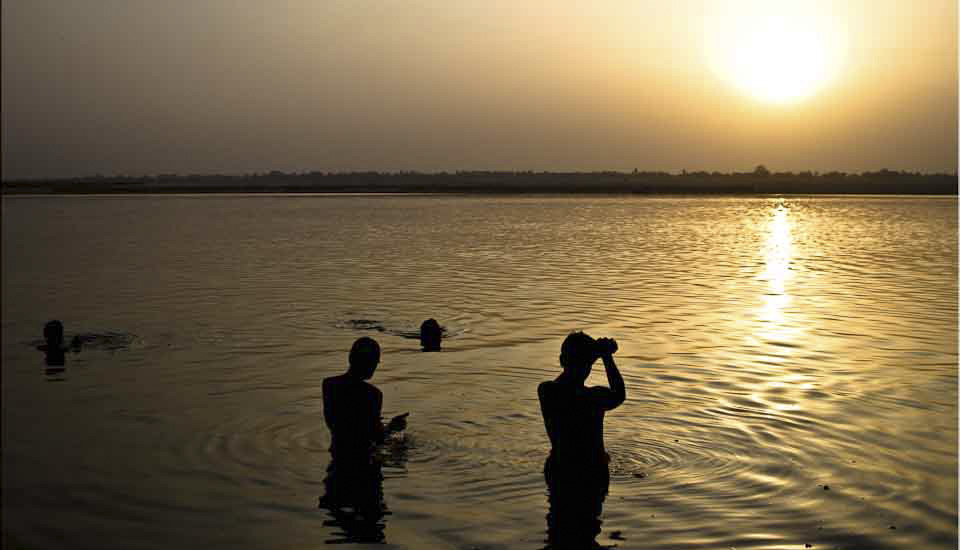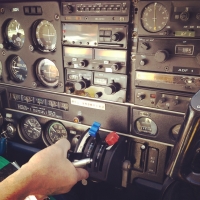.jpg)
The Kill
In the dusty morning light of Namibia’s Etosha National Park, five young male lions enjoy their fresh kill while hyenas watch for the chance of scraps.
There is nothing romantic about nature.
But, nor can you call nature “cruel”. Cruelty implies intention.
I watched The Lion King again recently – I had grandchildren visiting – and it was interesting to reflect on the difference between that romanised version of life in the savanna and my memories of my time in Etosha National Park in Namibia.
My visit to this large African nation – years ago now – was during August: the height of winter in the Southern Hemisphere and dry season in Namibia. It was my last morning in the country and the guides around the King Nehale Waterhole where we had been camping were abuzz: lions had been spotted! So, I was driving around the park with photographer Ben McRae and local guide guide Morne Griffiths.
We had found a group of five young male lions the afternoon before (see: Going on a Lion Hunt); they mostly sat around a waterhole yawning and stretching. Truthfully, I had actually enjoyed watching all the other animals more.
But this was different!
It was still early when we got to the waterhole where the lions had been seen. It was not yet 6:30 in the morning, and although the winter sun was up, it had yet to warm the dusty air or shed much light on the panorama before us.
The five young males were again sitting around. The difference was that they had made a kill during the night: a small springbok was no more. Clearly, they were feeling sated, as they ignored – for a time – the pack of hyenas scrabbling around their prey. Once they decided to reclaim their prize, however, there was no contest! It was easy to see where the Disney creators of the animated feature got their ideas for the personalities of the animals in The Lion King: the lions do seem to saunter regally while the hyenas skulk!
We spent a good hour and a half watching from the safety of our safari truck as the drama unfolded before our eyes. Eventually, the lions – presumably full and bored with all the attention – wandered off across the road in front of us and into the scrub.
.jpg)
Lions in the Sunrise
It was hard to see what was going on through the barely-lit dusty air: on the other side of a waterhole, five young male lions were resting or casually strolling around…
.jpg)
Hyenas in the Dust
… while a pack of hyenas yelped and cackled as they fought each other for bits of meat and bone.

Lions in the Morning
For a while, the young males seem barely interested in the havoc the hyenas were causing…

Fighting over the Kill
… as they continue to fight around them.

Lions on the Move
Clearly, their patience has limits! As a group, the males got up and sauntered around the waterhole …

Lions and Hyenas
… to simply and easily reclaim their prize.

Black Backed Jackal
Other animals keep a bit of distance.

Lions Eating
The lions make short work of their catch …

Lions and a Hyena
… as a hyena lopes past. There is something about the hyena’s body-shape that makes it look as if it is cringing or slinking.

Spotted Hyenas (Crocuta Crocuta)
Up close, hyenas look fuzzy and adorable – but those jaws are designed for grinding bones: hyenas have the strongest bite-strength of any land animal.

In a Cloud of Dust
Jackals and hyenas circle the feasting lions hopefully.

Hyenas with Food
Unlike the lions who sit together eating at their own pace, when a hyena gets a bone or scrap of skin, he or she has to make a run for it …

Fighting for Scraps
… or fight off contenders. As you can see from the truck-top in frame, this is all happening right in front of us.

Hyena Silhouette
The effects of the sun ascending through the dust gives rise to interesting light. It is not yet 7:00am on a winter morning.

Hyenas Chasing
Another hyena makes off with a bit of bone – with more in pursuit. Hyenas can run at speeds of up to 60km/hour, and are quite capable of hunting their own prey when a lion-kill is not available. One of the things that surprised me was the range of colouring among these unique animals.

On the Veld

Helmeted Guineafowl – Numida Meleagris

Lions Reflected
It is twenty after seven, and the lions have had their fill. They leave the bones and scraps for the scavengers, and make their way as a group, around the waterhole …

Lions in the Landscape
… and into the scrub.

Lions
Still licking their lips – or is that my Disney-influenced imagination? …

Young Male Lion
… they pause, …

Young Male Lion
… and one at a time, …

Lion Crossing the Road
… file across the road in front of us before disappearing.

Border Crossing
Sadly, it is time to leave the park. To prevent animal illness, as we cross from one area into another our truck drives through a solution and has its under-carriage sprayed. (iPhone6)

Morne and his Reward
We had promised our guide Morne a reward if he found lions for us; he chose to accept this in the form of his favourite brandy, which we sourced at the first stop outside Etosha National Park. (iPhone6)

What a fitting end to a wonderful two weeks of travelling around Namibia!
I couldn’t help but hum “The Circle of Life” from The Lion King as we followed Namibia’s bumpy highways back to Windhoek and our airplanes home.
Happy Travels!
Pictures: 22August2015





























.png)

